Present
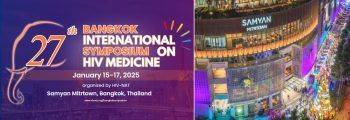
The 27th Bangkok International Symposium on HIV Medicine will be held at Samyan Mitrtown Hall, Bangkok. The Symposium’s objective remains to provide the most up-to-date information on HIV and related fields to healthcare professionals who may not have the opportunity to attend international conferences. A brief summary of the conference report is accessible in the *Future Virology* journal, available open access.
2023-2024
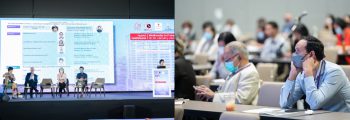
With the easing of COVID-19 restrictions, the Symposium adopted a hybrid format, allowing both virtual and on-site attendance at Samyan Mitrtown Hall, Bangkok, Thailand.
2021-2022
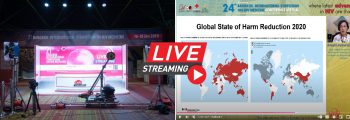
Due to COVID-19, the Symposium transitioned to a virtual format, allowing continued access to its educational programs despite restrictions.
2020

Following an extended tenure at the Queen Sirikit National Convention Center, the Symposium venue was relocated to BITEC, Bangna, Thailand, due to renovations. This year, for the first time, a 7:45 am JIAS workshop was held on how to write and submit a research manuscript.
2013
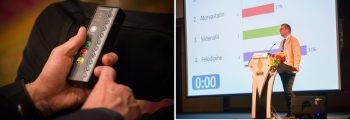
E-voting was introduced in the afternoon workshops for case studies, enhancing participant interaction. Pre-conference workshops were also incorporated into the program, covering topics such as Biostatistics for clinicians, Clinical HIV and STD prevention and management for gay men, men who have sex with men, and transgender individuals (sponsored by TREAT Asia, amfAR) and HIV and Nutrition, hosted by The Asia Pacific Collaborating in HIV-Nutrition (APCHIN) Centre, TRCARC, World Food Programme, and The Albion Centre, Australia. The objective of the Symposium remained to provide physicians in Thailand and other countries in the region with up-to-date information on treatment and new developments in managing patients with HIV infection.
2012
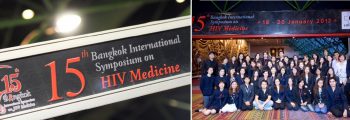
The Symposium was officially renamed the Bangkok International Symposium on HIV Medicine, reflecting its growing international scope and influence.
2010
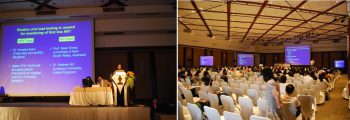
The Great Debate was introduced to the Symposium program and became a popular feature. Although it was not offered every year, it returned in 2024 due to increased demand.
2002
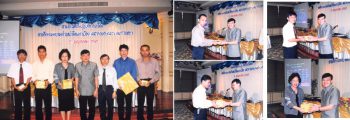
Afternoon workshops and case studies were introduced to the Symposium, allowing for more interactive and specialized learning opportunities for participants.
2000
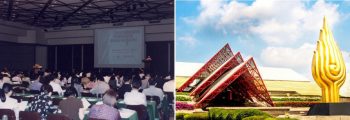
As the Symposium gained traction and recognition for its educational quality, it was moved to a larger venue at the Queen Sirikit National Convention Center. The new objective emphasized recent developments in therapy and prophylaxis, as well as information exchange through poster presentations. This year, panel discussions were also introduced to the Symposium.
1999
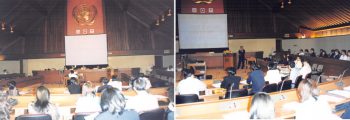
The Symposium provided important information for physicians treating PLWH, covering topics such as clinical manifestations of HIV in adults and children, opportunistic infections, antiretroviral drugs, and prevention of mother-to-child transmission. The objective of the Symposium was “to expose physicians with less experience in HIV medicine in Thailand and other Asian countries to updated and practical information about the diagnosis and management of patients with HIV infection.” A total of 280 participants attended, coming from Thailand, Malaysia, Indonesia, the Philippines, Taiwan, and India. This year, the Symposium was held at the United Nations Conference Centre (UNCC), Rajadamnern Nok Avenue, Bangkok.
1998
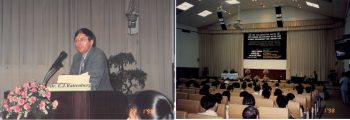
The co-founders developed and organized the very first Bangkok Symposium on HIV Medicine in 1998, held at Bamrasnaradura Hospital. The aim was to equip Thai and regional physicians entering the field of HIV medicine with essential skills and knowledge for managing people living with HIV (PLWH). Speakers were primarily from Thailand, with some from the USA, Australia, and the Netherlands. There were 189 participants. The co-founders agreed that the Symposium would be held annually, every third Wednesday of January, for three days.
1996
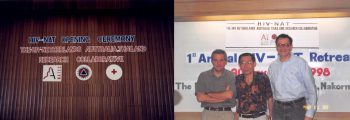
After HIV-NAT was established in 1996 by the Late Professor Dr. Joep Lange from the Amsterdam Institute for Global Health and Development (AIGHD), the Netherlands (formerly known as the International Antiviral Therapy Evaluation Centre, IATEC, Amsterdam), Late Scientia Professor David Cooper from the Kirby Institute for Infection and Immunity in Society, University of New South Wales, Sydney, Australia (formerly known as the National Centre in HIV Epidemiology and Clinical Research, NCHECR), and Scientia Professor Praphan Phanuphak from the Thai Red Cross AIDS and Infectious Diseases Research Centre, Bangkok, Thailand (formerly known as the Thai Red Cross AIDS Research Centre, TRCARC), they began collaborating on advancements in HIV research and treatment.
